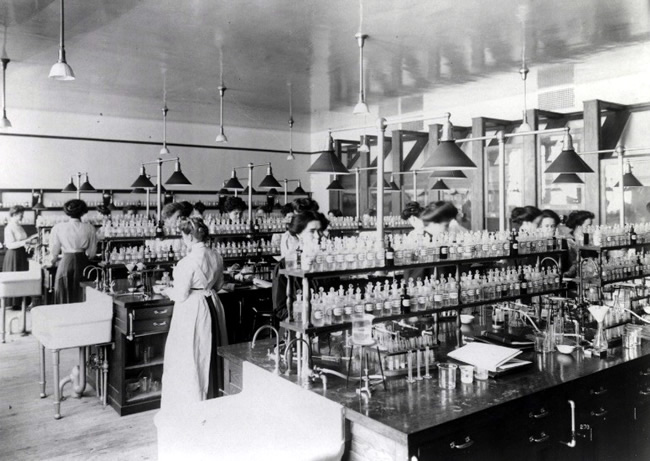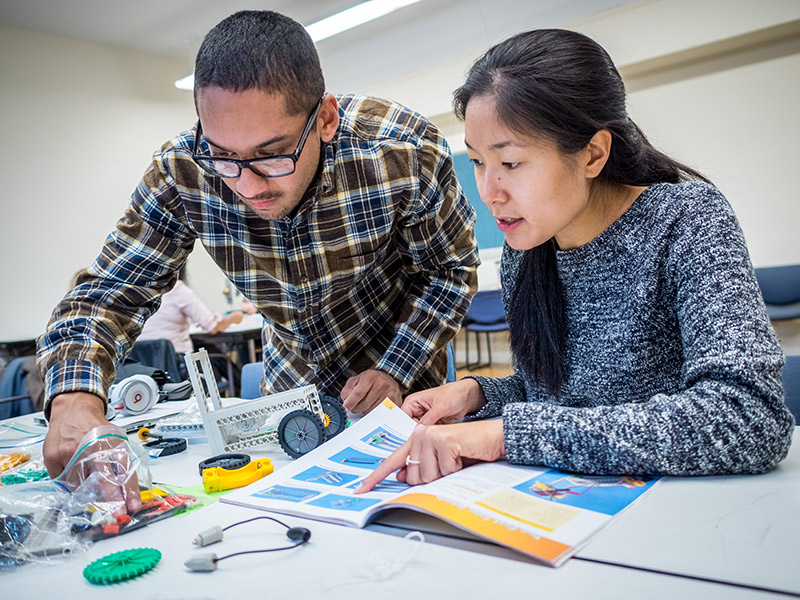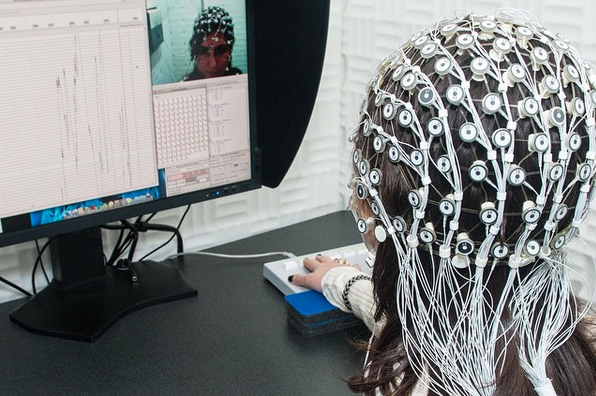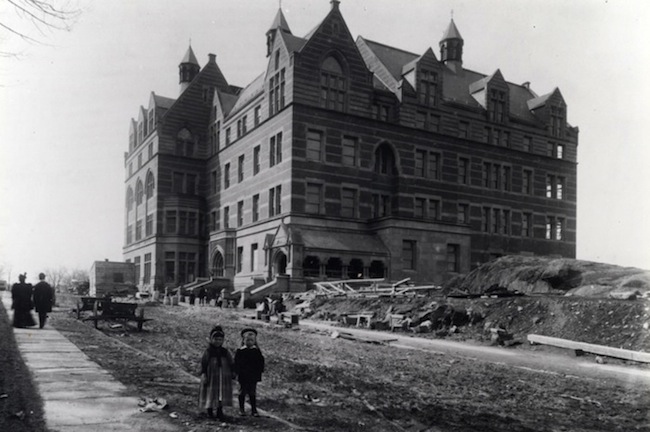The world in which TC was created in 1887 faced challenges much like those of today. Industrialization and technology were creating both enormous wealth and deep economic divisions and uncertainty. A vast new influx of people was pouring into U.S. cities from rural areas and from other nations around the world. Communities were grappling with complex new problems of health, race relations, education and crime.
Teachers College, which was conceived to meet all of these challenges, reflected the collective consciousness of the era’s leading scholars, practitioners, philanthropists, social reformers, and public-minded citizens. The result was an institution that, through the dynamic linking of theory, research and practice, not only met but also anticipated the needs of subsequent eras, serving as an ongoing and trusted source of solutions to which the nation has turned again and again. Or as The New York Tribune wrote in a 1915 obituary of the philanthropist Grace Hoadley Dodge, who was perhaps the single most important driving force in the College’s creation, “It was said of her that she had the 100-year look—that is, she looked ahead a century and made her plans accordingly.”
It all began humbly enough. In 1880, Dodge created a “kitchen garden” school in Greenwich Village to teach cooking, sewing, hygiene, and other practical arts to poor, immigrant women. As the effort took shape, she realized that a new kind of pedagogy was in order—teaching that reflected an understanding of learners’ backgrounds and of how to present material in relevant, meaningful ways.
By 1887, with the help of the Columbia University philosopher Nicholas Murray Butler, and with a site at West 120th Street donated by the industrialist George Vanderbilt, Dodge’s kitchen garden school had evolved into something much greater: an entirely new kind of school devoted to teacher education. In 1892, with Butler as president and a board of trustees that included representatives of the city’s leading philanthropic families, including Vanderbilt, Rockefeller, Trask, Macy, Dodge, Choate, Olney, Milbank, and Hyde, the new institution formally incorporated under the name Teachers College.
By the turn of the century, under new dean James Earl Russell, the vision for Teachers College had expanded yet again, marrying humanitarian concerns with a broad-based scientific approach to human development premised on the interrelationship among three broad areas: education, psychology and health.

Grace Dodge Hall. Chemistry Laboratory With Students. (Ca. 1910). Gottesman Libraries at Teachers College, Columbia University.
Indeed, the College’s most iconic figure, John Dewey, was a psychologist and education philosopher who served as President of the American Psychological Association, while its next great psychologist, Edward Lee Thorndike, introduced the scientific method to the study of learning. Working from four central imperatives—general culture, special scholarship, professional knowledge and technical skill—the College, during its first 25 years, launched the nation’s first programs in education psychology, comparative and international education, nursing education, nutrition education and special education. At the same time, TC’s teaching, psychology and health programs helped reshape the K-12 classroom from a place of formalized, rote learning into a center that addressed the whole learner through hands-on experience in which students played an active role in making sense of their own environment. This same outlook was reflected in schools that were founded and managed by the College, including the Horace Mann School and the Speyer School—the latter of which was among the nation’s first K-12 schools to provide a range of services that supported learning, physical health and emotional and psychological wellbeing in the surrounding community.
In 1923, the College created an International Institute that, by the time it closed 15 years later, had drawn more than 4,000 students to TC, including a corps of Chinese scholars who returned home to lead the modernization of their country’s school system. The Institute also sent faculty members to study education systems around the world.
Also during the 1920s, TC faculty member William Heard Kilpatrick, Dewey’s great disciple, introduced “The Project Method,” a practical approach to implementing John Dewey's educational philosophy that allows students to solve problems with minimal guidance from a teacher.
The relationship between anthropology and education, too, formally took root at Teachers College, dating back to the College’s affiliation with Columbia University in 1898, the year in which Columbia established its anthropology department. TC formally offered courses in anthropology beginning in the 1930s. The anthropologist Margaret Mead taught at TC from 1947 into the 1970s, and in 1963, TC offered its first Ph.D. in Educational Anthropology. In 1968, TC and Columbia created a joint program in Applied Anthropology that was administered at TC.
During the first half of the 20th century, TC faculty members and graduates shaped the fields of educational and psychological assessment, social studies education, urban education and the study of gifted children. Teachers College also collaborated with governments and education institutions around the world, while assisting in the creation of UNESCO in the wake of World War II and launching a teacher training program in East Africa that was the precursor to the Peace Corps.
After World War II, in response to rapid development of new professional roles, the College led in the development of the fields of counseling psychology, social and organizational psychology, conflict resolution, speech and language pathology, audiology, post-secondary education, international education, and the teaching of English to speakers of other languages.
In the 1970s and 1980s, TC luminaries such as education philosopher Maxine Greene and psychologist and urban education authority Edmund Gordon championed a social justice vision of providing all learners with access to the arts, afterschool programs and other supports.
And during the past 25 years, TC has led the fight in all fields to create a smarter, healthier and more equitable world. Responding to the growing need for educational, psychological and health services that reach beyond the traditional school environment, the College has designed programs for educators who will work in daycare centers, family assistance agencies, museums, libraries, businesses, nonprofits, telecommunications facilities, the United Nations, and other non-traditional locations.

TC faculty are leaders in developing new models of teacher preparation that more tightly link field experience with new research about learning. The College recently launched a new doctoral specialization in teacher education.
We have launched new areas of inquiry and new practices in education technology, neuroscience, cognitive psychology and counseling psychology. And we are leaders in health education, community health, movement sciences and kinesiology, social and behavioral sciences, education policy, international and comparative education, and education leadership.
TC’s three highly complementary and interrelated areas of study – education, psychology and health – span more than 65 programs of study. Our past and current accomplishments constitute a living legacy, a foundation from which we will continue to meet society’s needs and anticipating the needs of the future.

TC is advancing a new understanding of how people learn, based on cutting-edge research in cognitive and organizational psychology, neuroscience and other fields.
Our faculty members are leaders on many fronts, including:
- Creating comprehensive educational opportunities through wrap-around services for students, their families, and the communities that surround schools. The Teachers College Community School and our network of Harlem Partnership schools form the nucleus of this effort, together with work by our policy researchers and economists to understand the costs and returns on investment of providing comprehensive services.
- Spirituality and psychology. TC is home to Ivy League’s first master’s degree program in this emerging field, anchored in scientific research about the impact of spiritual practices on the brain and emotional and physical health.
- Conflict resolution and social justice. Multidisciplinary centers like The Morton Deutsch International Center for Cooperation and Conflict Resolution and the Institute for Urban and Minority Education are shaping the study and practice of peace, conflict and social justice.
- The field of nutrition education and policy. TC is home to the nation’s oldest nutrition education program. In the 1970s, Joan Gussow, now Professor Emerita, became, as the New York Times describes her, the matriarch of the eat-local-think-global food movement. Today, our nutrition faculty members are leaders in understanding the societal and psychological barriers to healthy eating – work that has been amplified by the College’s Laurie M. Tisch Center for Food, Education & Policy.
- The broader field of policy and advancing research-based policy recommendations that address issues in education, health, nutrition, psychology and other fields. This work is now coordinated through a new department of Education Policy and Social Analysis that brings together what is arguably the finest concentration of policy expertise in the nation.
- Learning, and advancing a new understanding of how people learn, based on cutting–edge research in cognitive and organizational psychology, neuroscience and other fields.
- Developing new models of teacher preparation that more tightly link field experience with new research about learning.
- Leadership and research that is redefining traditional notions of leadership and creating new paradigms for well-run organizations. The College’s Eisenhower Leader Development Program, conducted jointly with the U.S. Military Academy at West Point, is seeding change in leadership style in the U.S. military.
